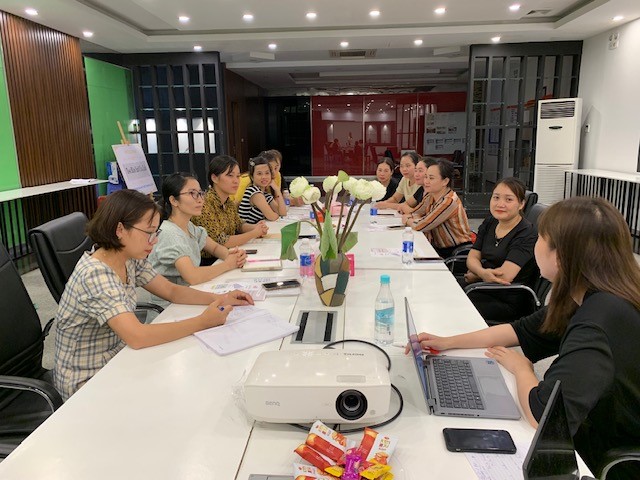Partner driven workplaces boosts productivity and rights
SWP exists because we believe that sustainable business starts with a partnership based on trust and respect between managers and employees. This is achieved through dialogue at the workplace. It creates the foundation for a more responsible business conduct and support the ongoing transition to a carbon free economy.
Our Strategy for change:
1. Without Collaboration, skills, and access to Decent jobs, the Green Transition is at risk
A sustainable green transition relies on cooperation, equipping workers with new skills, and ensuring access to formal, decent employment to avoid conflicts and climate related migration and hinder development.
Jobs are at the heart of development. In Africa alone, the workforce is expected to grow by 750 million people by 2050. To alleviate poverty it is essential to create jobs that are productive, decent, and formal so people have the opportunity to shape their life. Formal waged employment currently represents only one-third of jobs in developing countries. Poor people are often employed in the informal sector, in temporary jobs, or lack the ability to influence their working conditions, safety, and health. Decent work is a fundamental human right. Yet to many businesses and states fail to uphold ILO’s core conventions. Social dialogue is a cornerstone to achive decent work as it improves both business performance and workplace equity.
Trade and integration into global supply chains positively impact poverty reduction. It create jobs, especially for women and youth, drive formalization, better conditions, and more secure employment. Despite these benefits, significant challenges remain in achieving living wages, decent conditions, and ensuring rights are upheld.
Artisanal Miners in DRC. Photo: Nkelu Bantu
The demands on businesses to ensure sustainability in their operations are increasing. Companies are taking on sustainablity commitments in line with global political frameworks. Within social sustainability voluntary actions are increasingly being complemented by binding legislation. For European companies, this requires improving compliance with labor standards in their value chains, particularly among suppliers. Sustainability is also reflected in european trade agreements. Complying with ESG standards reduces risks and costs while enabling access to markets and global value chains. There is a risk of exclusion of companies in low- and middle-income countries from value-chains if they fail to meet these standards.
As such, partnerships are needed to develop knowledge and understanding of sustianblity requirements. Organizational culture also needs to adapt, and capacity must be strengthened to maintain opportunities for investment and integration into global value chains.
The ongoing green transition brings specific demands for the future of work. To fully harness the benefits of green solutions, new skills and competencies will be needed as old jobs disappear. A transition without the engagement of all stakeholders risks hindering development, negatively affecting climate goals, job creation, and creating labor market conflicts. Ensuring sustainability competency in value chains, particularly upstream, can mitigate these risks. This requires a shared investment by states, companies, and workers in upskilling. Social dialogue and collaboration is both a goal and an means towards this end.
Cooperation enables individuals to contribute to developing both businesses and their own conditions. It leads to better productivity, engaged and well-being-focused employees, and drives innovation. Through dialogue, both parties gain better information and opportunities for negotiations, conflict resolution, which reduces risks and improves compliance with laws, guidelines, and policies. Dialogue also enhances access to grievance mechanisms and remedies.
An effective social dialogue must be built on trust and respect. This is created when partners have the ability, willingness, and spaces to develop partnerships, joint goals, and solutions. Based on this, SWP has developed the following strategies:
2. How we create better conditions for dialogue and cooperation
Growth Engines
We upskill the capacity of managers and employees to engage in effective dialogue, and establish structures for effective collaboration at workplaces.
- Establish Workplace Committees
- Upskill managers and employees
- Use the leverage of Swedish companies and Unions for Knowledge
Shape Business Conduct
SWP partners with Swedish companies, trade unions, and business to influence policy and integration of social dialogue into local value chains.
- Provide Meaningful Stakeholder DialogUES
- Shape agendas on dialogue and decent work.
- Strengthen Swedish companies as champions
Scale Best Practices
SWP spreads models and lessons learned to a broader group of stakeholders—businesses, governments, and industry associations—to drive systemic improvements in labor relations, policies, and business environments.
- Spreading and institutionalizing good practices
- Supporting Team Sweden and Swedish Industry on Decent Work
The results we aim for
By empowering workers, influencing business practices, and scale best practices, SWP contributes to more secure jobs, better working conditions, and increased opportunities for people to shape their lives.

3. Our Impact:
Better work conditions
Strengthened trust and capacity enable dialogue-driven structures, leading to improved relations between managers and employees for safer, better and more productive workplaces.
Better Access to global supply-chains
Alignment with global Sustainability Standards. Companies and organizations are equiped to meet international sustainability and human rights due diligence requirements, making them better positioned to access international value chains.
Implementation of the Decent Work Agenda
SWP contributes to the achievement of the Decent Work agenda. Improved workplace cooperation that reduce risks. Successful practices are replicated across industries and regions, also influencing policy and improving labor relations at a national level.
“Sida aims to ensure that people living in poverty have access to decent jobs, where their rights in the workplace are respected. The Swedish Workplace Programme
contributes to this goal by improving dialogue between employers and employees and strengthening labour rights.
Follow-up of the Programme confirms that it brings important change, for example in terms of better working hours, safety andsecurity at the workplace.”
Factors for success
Why our partners take interest in SWP
- Partners view SWP as a neutral third-party actor with strong legitimacy and expertise to facilitate discussions on sustainability and dialogue.
- This gives us a unique role in addressing difficult and sensitive matters with various stakeholders as we represent and incorporate both the employee and employer perspective.
- Companies and investors have a vested interest and a duty to respect and uphold decent work as part of human rights frameworks like OECD guidelines, ILO core conventions .
We apply common values to local problems
- SWP is adaptable and provides tailored coaching to each workplace based on its unique conditions, thereby fostering sustainable change at the workplace level.
- We design our programmes togther with our local partners to make ownership local.
Focus on results that lasts
- Dialogue structures that have been integrated into the company organigram and assigned own budgets continue to be successful after SWP exit.
- When managers and employees become aware of the benefits of workplace dialogue. Companies find new ways to productivity and well-being.


